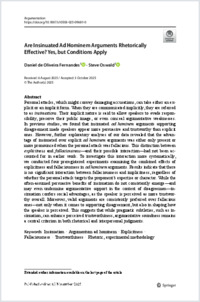Are Insinuated Ad Hominem Arguments Rhetorically Effective? Yes, but Conditions Apply
BLE-BLL
- De Oliveira Fernandes, Daniel ORCID Université de Fribourg
- Oswald, Steve ORCID Université de Fribourg
- 2025
Published in:
- Argumentation. - Berlin: Springer Nature, 2025. - 2025
insinuation
argumentum ad hominem
explicitness
fallaciousness
trustworthiness
rhetoric
experimental methodology
English
Personal attacks, which might convey damaging accusations, can take either an explicit or an implicit form. When they are communicated implicitly, they are referred to as insinuations. Their implicit nature is said to allow speakers to evade responsibility, preserve their public image, or even conceal argumentative weaknesses. In previous studies, we found that insinuated ad hominem arguments supporting disagreement made speakers appear more persuasive and trustworthy than explicit ones. However, further exploratory analyses of our data revealed that the advantage of insinuated over explicit ad hominem arguments was either only present or more pronounced when the personal attack was fallacious. This distinction between explicitness and fallaciousness-and their possible interaction-had not been accounted for in earlier work. To investigate this interaction more systematically, we conducted four preregistered experiments examining the combined effects of explicitness and fallaciousness in ad hominem arguments. Results indicate that there is no significant interaction between fallaciousness and implicitness, regardless of whether the personal attack targets the proponent's expertise or character. While the often-assumed persuasive benefits of insinuation do not consistently emerge-and may even undermine argumentative support in the context of disagreemen-insinuation confers social advantages, as the speaker is perceived as more trustworthy overall. Moreover, valid arguments are consistently preferred over fallacious ones-not only when it comes to supporting disagreement, but also in shaping how the speaker is perceived. This suggests that while pragmatic subtleties, such as insinuation, can enhance perceived trustworthiness, argumentative soundness remains a central criterion in both rhetorical and interpersonal judgments.
- Faculty
- Faculté des lettres et des sciences humaines
- Department
- Département d'anglais
- Language
-
- English
- Classification
- Language, linguistics
- License
-
License undefined
- Open access status
- green
- Identifiers
- Persistent URL
- https://folia.unifr.ch/unifr/documents/333465
Statistics
Document views: 75
File downloads:
- s10503-025-09681-0.pdf: 31
